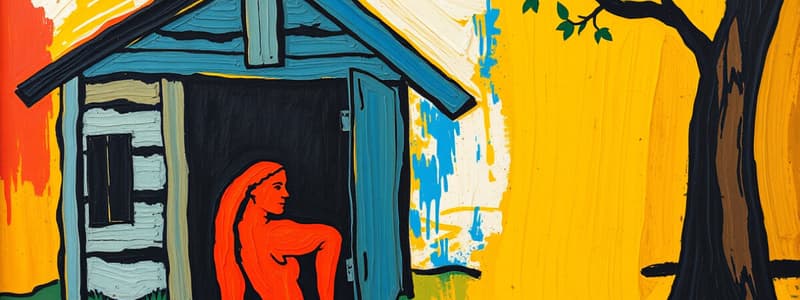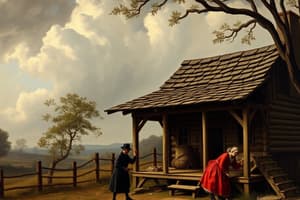Podcast
Questions and Answers
Who is the author of Uncle Tom's Cabin?
Who is the author of Uncle Tom's Cabin?
- John Brown
- Harriet Beecher Stowe (correct)
- James Buchanan
- Hinton R. Helper
What year was Uncle Tom's Cabin published?
What year was Uncle Tom's Cabin published?
1852
Who wrote The Impending Crisis of the South?
Who wrote The Impending Crisis of the South?
Hinton Helper
______ was a significant example of the problems associated with popular sovereignty.
______ was a significant example of the problems associated with popular sovereignty.
The New England Emigrant Aid Company aimed to support pro-slavery settlers in Kansas.
The New England Emigrant Aid Company aimed to support pro-slavery settlers in Kansas.
What was the outcome of the Lecompton Constitution?
What was the outcome of the Lecompton Constitution?
Which President tried to maintain a balance between pro-slavery and anti-slavery factions?
Which President tried to maintain a balance between pro-slavery and anti-slavery factions?
What was the Democratic party's stance in the Election of 1856?
What was the Democratic party's stance in the Election of 1856?
The Dred Scott decision upheld the principle of social responsibility of private property.
The Dred Scott decision upheld the principle of social responsibility of private property.
Who was the first candidate of the Republican Party for the presidency?
Who was the first candidate of the Republican Party for the presidency?
What did the Panic of 1857 primarily result from?
What did the Panic of 1857 primarily result from?
Match the following historical figures with their roles:
Match the following historical figures with their roles:
The Homestead Act of 1860 aimed to provide public lands for ___ an acre.
The Homestead Act of 1860 aimed to provide public lands for ___ an acre.
What major decision did Chief Justice Taney make in the Dred Scott case?
What major decision did Chief Justice Taney make in the Dred Scott case?
What was the Constitutional Union Party formed to do?
What was the Constitutional Union Party formed to do?
Lincoln won the Election of 1860 because of strong support from Southern states.
Lincoln won the Election of 1860 because of strong support from Southern states.
Flashcards are hidden until you start studying
Study Notes
Harriet Beecher Stowe
- Author of Uncle Tom's Cabin, which highlighted the harsh realities of slavery.
Uncle Tom's Cabin
- Published in 1852; contributed significantly to anti-slavery sentiment in the North.
- Portrayed the mistreatment of slaves, influencing public opinion against slavery.
The Impending Crisis of the South
- Written by Hinton Helper, arguing that non-slaveholding whites suffered most from slavery.
- Helper was a non-aristocrat from North Carolina and struggled to find a publisher for his book in the South.
Hinton R. Helper
- Authored The Impending Crisis, emphasizing the negative impact of slavery on non-slaveholding whites.
- Ultimately killed by Southerners for his views.
Kansas
- Site of conflict over popular sovereignty; attracted a mix of settlers, including Northern abolitionists.
New England Emigrant Aid Company
- Antislavery group that sent settlers to Kansas to undermine Southern interests and promote free soil.
Census of 1860
- Reported 2 slaves in Kansas and 15 in Nebraska, indicating limited slave presence in these territories.
Shawnee Mission
- During the 1855 territorial legislature elections, proslavery "border ruffians" from Missouri aggressively voted, forming a proslavery puppet government.
Lawrence, Kansas
- Starting point of violent clashes between pro-slavery and anti-slavery factions known as "Bleeding Kansas".
John Brown
- A radical abolitionist known for his militant opposition to slavery; hanged after the failed Harper's Ferry raid.
Pottawatomie Creek
- Location where John Brown executed five proslavery settlers, escalating violence during the conflict.
Lecompton Constitution
- Proposed constitution for Kansas that ensured the protection of slavery; rejected by Kansas voters.
James Buchanan
- 15th President of the U.S. (1857-1861), struggled to maintain peace between proslavery and antislavery factions, leading to heightened tensions.
Senator Douglas
- Advocated for popular sovereignty and promoted the Kansas-Nebraska Act; faced Abraham Lincoln in the 1860 presidential election.
Charles Sumner
- Delivered a speech titled "The Crime Against Kansas"; severely beaten by Preston Brooks after the speech, becoming a symbol of Northern outrage against Southern violence.
Preston S. Brooks
- South Carolina representative who attacked Charles Sumner in defense of Southern honor, symbolizing the deepening divide.
Election of 1856
- Featured Buchanan (Democrat), Fremont (Republican), and Fillmore (Know-Nothing); Buchanan's support of popular sovereignty led to his victory.
John C. Fremont
- First Republican presidential candidate, opposed slavery and highlighted the party's anti-slavery platform.
American Party (Know-Nothings)
- Formed in response to immigration and sought to limit the influence of foreign-born citizens in American politics.
Dred Scott
- Enslaved African American who sued for his freedom, raising critical constitutional questions regarding slavery.
5th Amendment
- Provides protective rights including grand jury guarantees, protection against double jeopardy, self-incrimination, and ensures due process.
Chief Justice Taney
- Delivered the ruling in the Dred Scott case, reinforcing the rights of slaveowners and the police power of states.
Panic of 1857
- Economic crisis primarily affecting Northerners, prompting calls for higher tariffs and land access for homeless citizens.
Homestead Act of 1860
- Proposed legislation to sell public lands at low prices but vetoed by Buchanan, reflecting political divisions.
Tariff of 1857
- Major tax reduction, reducing tariffs to a low point around 17%; preceded by the contentious Morrill Tariff in 1861.
Economic Issues of the 1860 Election
- Focused on protective tariffs and land for homeless individuals, highlighting economic disparities.
Illinois Senatorial Election of 1858
- Featured a significant contest between Senator Stephen Douglas and Republican challenger Abraham Lincoln.
Freeport Doctrine
- Arising during Lincoln-Douglas debates, Douglas argued that territories could reject slavery, defying the Dred Scott decision.
Harper's Ferry
- Site of John Brown's failed raid to incite slave rebellion; highlighted Northern abolitionist efforts and exacerbated Southern fears.
Robert E. Lee
- Confederate general who opposed secession but believed Union preservation shouldn't rely on force.
Election of 1860
- Abraham Lincoln won due to a divided Democratic Party, leading to increased Southern discontent and subsequent secessions.
John C. Breckinridge
- Pro-slavery Democratic candidate in 1860, contributing to Democratic Party fragmentation.
Constitutional Union Party
- Formed by former Whigs and Know-Nothings to oppose sectional candidates, nominating John Bell in 1860.
John Bell
- Constitutional Union Party candidate; attracted votes away from Democrats, facilitating Lincoln's election victory.
Confederate States of America
- Seceded republic composed of 11 Southern states from February 1861; exemplified the divisive nature of slavery.
Jefferson Davis
- President of the Confederate States (1861-1865), his leadership defined the Confederacy throughout the Civil War.
James Henry Crittenden
- Kentucky Senator proposing amendments to appease the South, ensuring protection for slavery in territories.
Crittenden Amendments
- Designed to resolve sectional tensions, prohibiting slavery north of the 36°30′ line while allowing it southward.
Studying That Suits You
Use AI to generate personalized quizzes and flashcards to suit your learning preferences.




